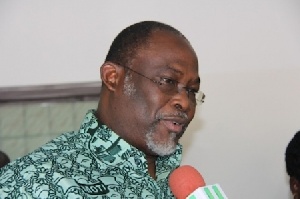The third edition of Ghana Economic Outlook and Business Strategy conference on Wednesday opened on the theme: “Diversifying Ghana’s Economy though Sustained Export Trade”.
The conference which was organised by the Africa Business Media, publishers of the Ghana Business and Finance Magazine, saw an influx of key industry players, academia, civil society groups, policy makers, non-governmental organisations as well as foreign investors among others, to offer their ideas.
It was intended to create a conducive forum for knowledge sharing, experiences, network, and also generate ideas and strategies to address the common challenges of Ghana’s export trade.
The event was seen as a timely intervention to signal a sea change in policy and approach, heralding the reforms that would finally set the Ghanaian economy on a sustainable path to prosperity.
Mr Kwame Pianim, Chairman of Airtel Communication, who represented the Vice President, Paa Kwesi Bekoe Amissah-Arthur, said although Ghana has been uniquely location at the centre of the world and endowed with all the rich natural resource, human resources and vegetation, it is yet to realize its full potential.
According to him the country is currently not doing well in terms of its export commodities and revenues accrued from such activities due to over-reliance on the traditional exports such as gold, cocoa and timber over the years, which has not yielded the required revenue for sustainable economic growth.
He said government is currently working on addressing the inconsistencies in policies to create an enabling environment to attract and motivate the private sector to invest in other areas of the economy such as the non-traditional export sector.
He urged the National Development Planning Commission to come out with a clear national vision and plans to help propel the country to realise the requisite growth and development.
Mr Pianim called for the need to align the numerous trade opportunities that exist, streamlining them and adding value to them in order to attract higher value on the world market.
Dr Ekwow Spio-Garbrah, Minister of Trade and Industry, said government has over the past three years succeeded in laying a solid foundation by formulating and implementing policies and programmes that had significantly transformed the economic landscape and created the enabling environment for the private sector to thrive.
The Ministry, he said through a multi-sectoral and stakeholder participatory approach, developed a National Export Strategy and its implementation framework, the National Export Development Programme with the aim of developing the potential of non-traditional export sector for the realisation of a set target of five billion dollars in foreign exchange earnings by the end of a five-year period.
He said the thrust of the strategy was to strengthen stakeholder institutions and to provide direct enterprise level support to beneficiary exporters to enable them expand their production.
Mr William Hanna, Head of the European Union Delegation to Ghana, allayed fears about the uncertainties about the new Economic Partnership Agreement and urged Ghanaian businesses to take advantage of its benefits.
The Chinese Ambassador, Ms Sun Baohong, recounted her country’s development challenges and said Ghanaians must build the resilience in order to achieve the needed growth in its export and on the domestic market.
Click to view details



Business News of Thursday, 22 January 2015
Source: GNA
Economic Outlook and Business Strategy conference opens
Entertainment
















